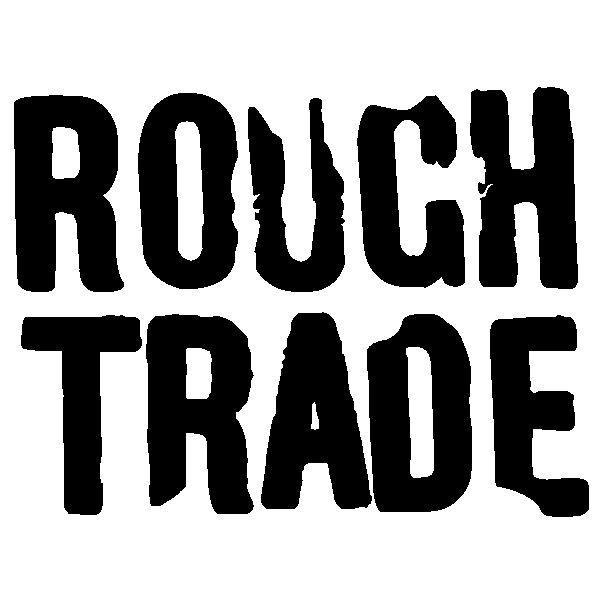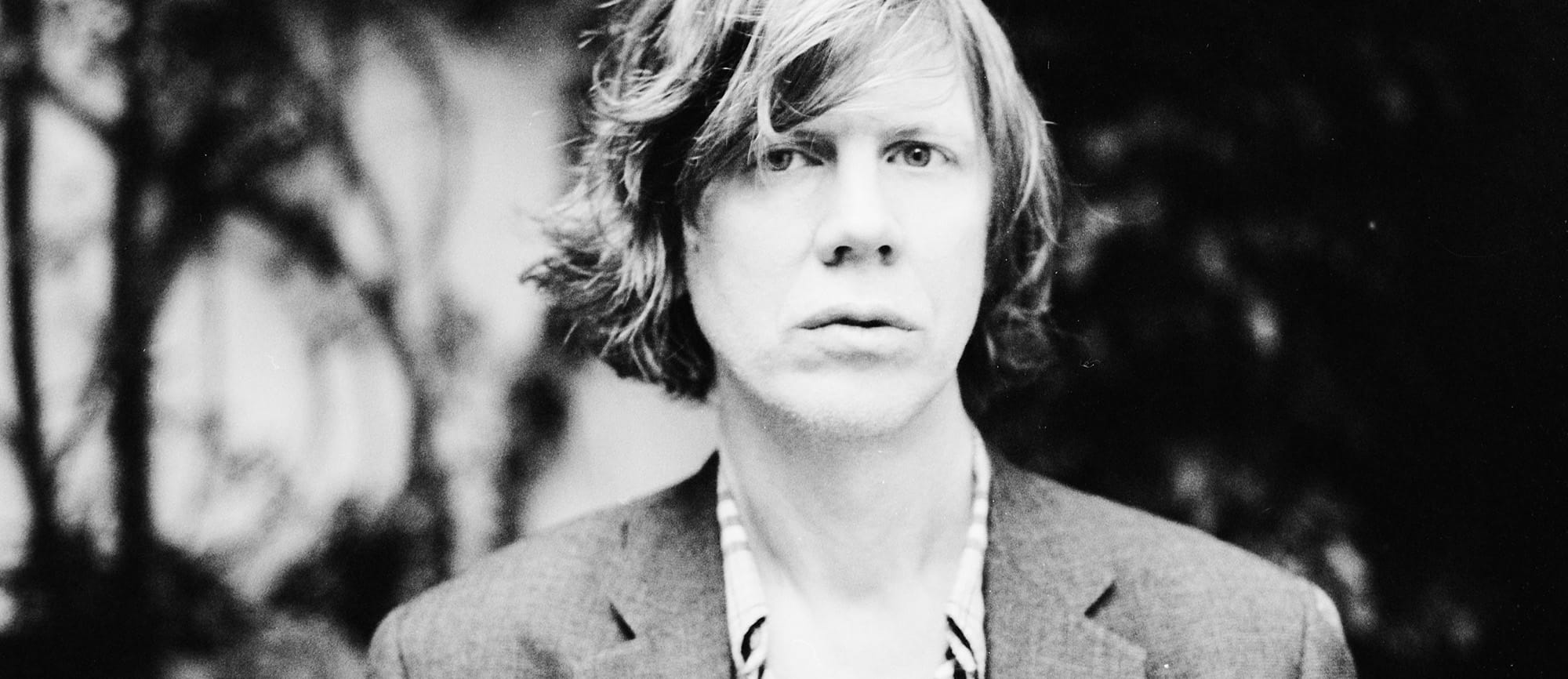"I always thought Sonic Youth started that way - what is the band that we would like to see on stage? And it wasn't something that we talked about or articulated. But I think we kind of knew that's what we were generating, what we were going for and I think I felt the same way with writing."
Interview by Emily Waller
Photo by Vera Marmelo
Thurston Moore loves detail. His long-awaited memoir Sonic Life (Rough Trade Book of the Year 2023) is an authentic retrospective that obsessively chronicles the artist's infatuation with music, from early beginnings in 1960s Connecticut, to the subversive world of New York City and his eventual co-founding of storied experimental rock group Sonic Youth. Speaking on a video call in late 2023, his passion for history practically bleeds from the screen as he talks at length about his writing process and both the challenges and joys of recollecting such a fascinating and formative life.
"I like to retain mystery" says Moore. After over an hour of thoughtful conversation that, in the very best way possible, has felt like so much longer (so considered and rich are the answers he offers), I'm suddenly very aware that I've barely scratched the surface. But what's abundantly clear is that penning his book has been an enormous labour of love and as our discussion comes to a close, I'm left with certainty that this won't be the last writing we see from him.
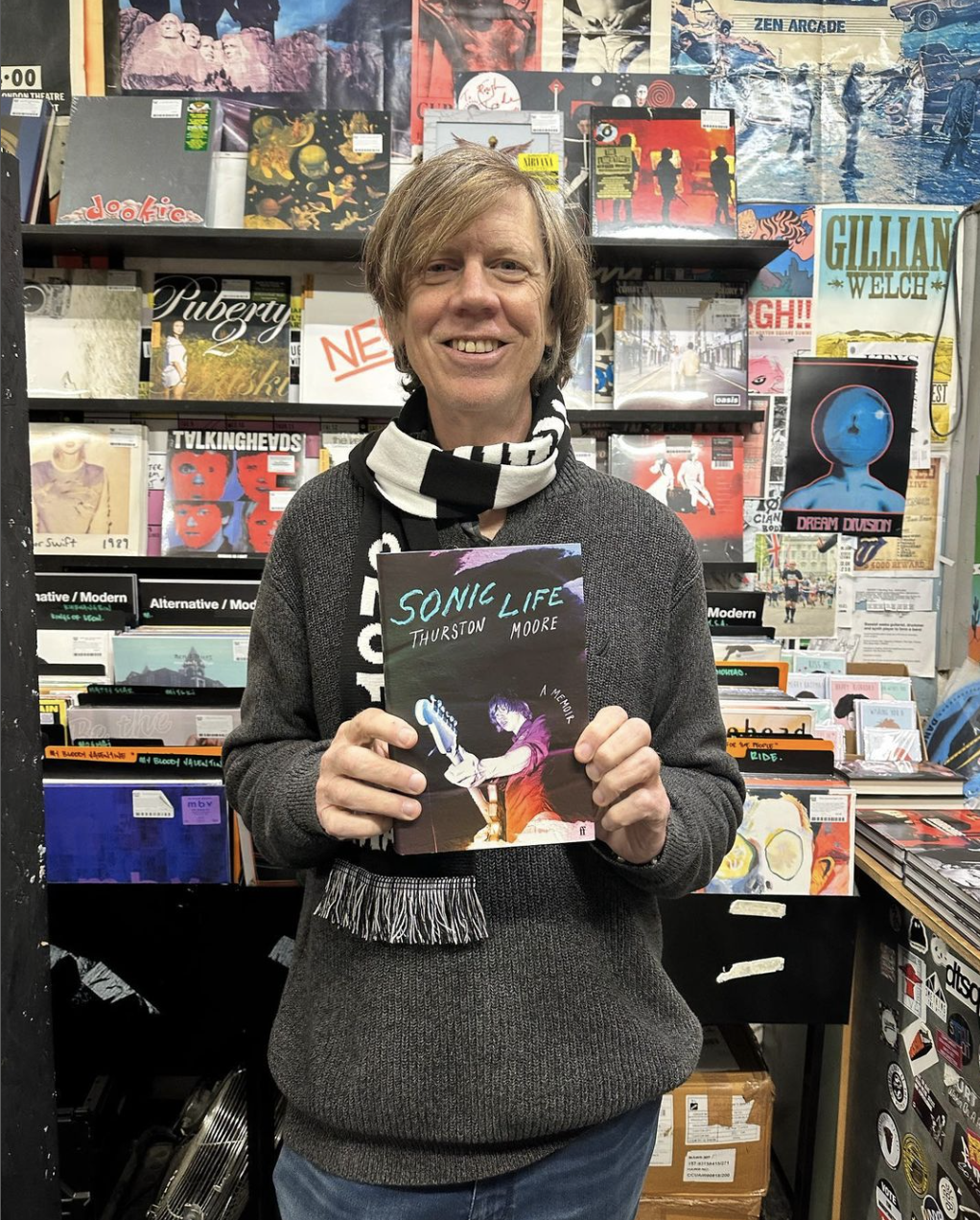
Has putting your story to paper been a journey you always knew you would arrive at, or is it something that you’ve perhaps more recently decided you’d like to do?
I always wanted to write a book that was proper book length. I mean, I've done a lot of publishing and writing through the years - I do a poetry journal called Ecstatic Peace Poetry Journal, which I edited and published for a number of years. I've certainly written a lot of journalism, music journalism, but I've always been sort of a frustrated music journalist from the very beginning. So, as a long time book lover and book collector, I always sort of had the desire to have a full-length book of writing out and regardless of what the content was, I just sort of really desired to have something like that exist because I really love to write. I just enjoy writing so much that I wanted to sort of like, really engage with it and I was a little surprised that I never really had any lengthy book out through the years, but I guess a lot of it has to do with being so preoccupied with making records and going on tour, so that's certainly my excuse.
The device of a memoir sort of fit very nicely, I mean, that was the easiest thing to do and I had always been asked if I would someday write a memoir of sorts. And I kind of was not that into it because it was not something I wanted to write about, just me, me, me, you know? And actually, I first thought I would write a book that was more of a music essay. Then I got to this point where I was going to write more specifically about the ephemera and the documents and the signifiers that pointed to the development of a young person getting involved with music as a vocation, subsequently having a band that had some kind of high profile in the micro community. So I wanted to be at a point where I could talk at length about, say, Patti Smith's first book of poetry, Seventh Heaven (1972), and how essential that was as a voice in the mid-seventies, not only to me, but to so many people around the globe. But we didn't really know each other until later, you know, until we started meeting each other in the same places which were the clubs, the venues and the record stores and the letters section of certain magazines, fan scenes and such. And that, again, that whole aspect was interesting to me as well, the social climate. I want to write about all those things as opposed to my own personal life in that regard. But I realised that through writing about my history leading into Sonic Youth, it made a lot of sense as a device to sort of write about these things and I read about them at length.
The book was about 800 pages and it's about 500 pages now, which is huge for a music memoir. I spent time in New York with the editor editing it down, but again, that was entirely enjoyable as the whole process of writing, all the aspects of it from publishing to editing, everything about it, I loved. The editorial decision was like, “the book should be about you, it is your memoir.” I didn't even like using the word memoir so much, I kind of wanted it to be a collection of essays about music, but I realised that the way the book was being published, through mainstream publishing imprints Double Day in the USA and Faber here the UK, that for those imprints to be really interested, it needed to be a proper prototypical memoir, music memoir. And I was ok with that and so I went for it, talked about aspects of my life that I felt offered a good energy to the book. I steered away from things I thought dealt with negative energy, which is the great criticism of the book, like, "how come you don't write about your divorce? How come you don't write about these terrible other things in your life?" And I was like, well, I write about some terrible things, but I didn't want to invest that kind of negative energy into the book and perpetuity. So this is a personal decision as such. I really wanted the book to be a sort of celebration, so that's primarily what it is. Plus it's just not enough real estate, I'm already cutting out some of those things and I think it would be really compromised and rather pithy to just talk about things of such a serious nature. In the context of a book where there's so much information going on it either needs to be dignified in a stand alone publication or not at all. And I chose for it to be not at all because a lot of that information is just so private to me, it's something I would share with my family and intimates but it's not something I really want to commodify.
So how long did it take you to write in total?
I mean, I started putting pen to paper in 2020/2021. The pandemic really allowed me to stay in one place and it was fortuitous for writers to not move away from laptops, so that put me in a place where I could really focus and concentrate and not leave the house and go to Heathrow and fly off to a gig here and there. So yeah, that year was really the year that I got most of the writing done for sure. It took about three years in total.
"...you can't really remix a book, can you?!"
How does writing a book compare to writing a record in terms of completion - was it harder or easier to arrive at a point where you felt it was finished?
I feel like I had to sort of share the completion with my editor. I knew that my editor had to be happy with it and I needed to sort of respond to the editor’s expertise in what the voice of the book was. I think at first I had this idea that I'd be more meta, maybe more gonzo in the writing. And, you know, he kind of thought a lot of that was a little too much for the casual reader and I had to find a balance between the more rock and roll writing as well as more conservative linguistics or whatever. And I was fine with that because to me it was relative to the kind of music I was always interested in anyways, whether it was Sonic Youth or solo work, this balance between more challenging concepts and more acceptable concepts. So to me that was the relative thing between making a record and making the book. I think making a record, especially now as a solo artist of sorts (I have a London-based band but it's under my name and I pretty much call the shots) it's not much of a democracy at the very end of the day. But in the process of making the music, I allow the musicians to sort of employ their voice as much as possible. But I do make the last decision on what it looks like, what it sounds like and what's going on with it and that wasn't ever the case with Sonic Youth. It was always this kind of “Sonic democracy” between the four or five members at any given time. And in some ways, I really felt like when I got into my fifties and sixties, that I didn’t want to be in a group where it was a collective decision making process. I appreciated it for the thirty plus years that it existed, but I don't really require that as much with the book. The book was definitely going to have to appeal to the publisher/editor in the way it was presented and I certainly like working collaboratively and I understood the parameters of it but, I don't know, you can't really remix a book, can you?! I mean, yeah, there's a few little typos here and there that I have found that no reader would ever possibly locate… but I've seen them because I had to read it so many times and even the audio book, I would hit the same little preposition or something that wasn’t quite right. So in subsequent printings that can be changed, but you can't really remaster a book and you always want to read the original document. With records, when people remaster or have records remixed or whatever... like Gang of Four will actually re-record their classics and play them better. We're better now. And it's like, well yeah, but I don't want to hear it better, I want to hear that initial impetus that you had in your youth. Nothing compares to that, nothing competes with it. So, interesting aspects, but I think that's a fairly distinct difference between publishing a book and publishing music.
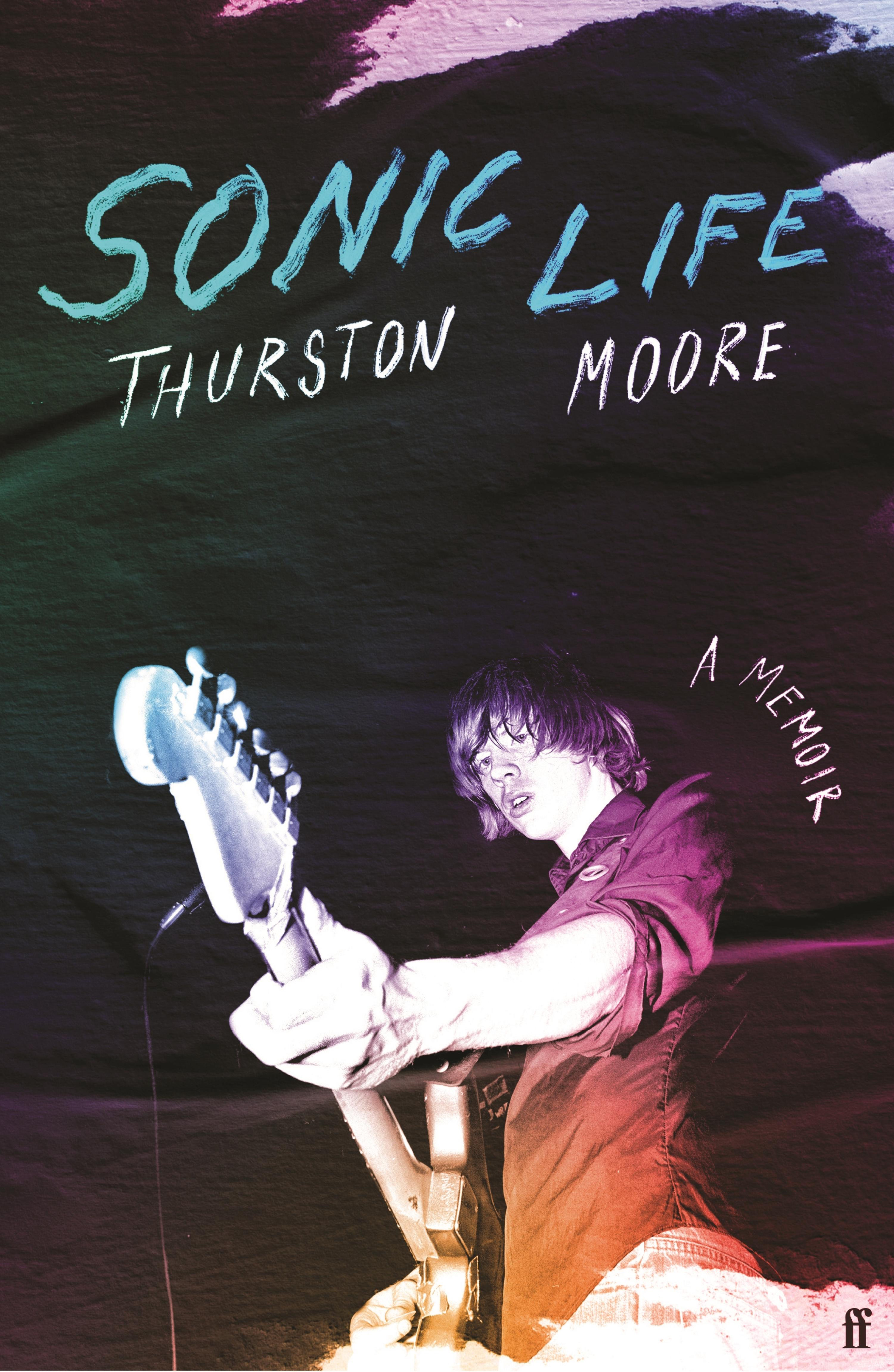
Were there instances in the book where you felt you had to include certain things to better serve the story of the band, as opposed to anecdotes or memories that you would want to relay purely for personal pleasure? Essentially, how much did the audience for this book dictate how you went about structuring it?
That's a good question. I don't think I was really thinking too much about what anybody wanted from me writing a memoir. I realised that a lot of the anecdotes that kind of move the book along in some ways are kind of small-time in a way. I mean, yeah, you have interactions with some of these icons, whether it be Patti Smith or Iggy Pop or Nick Cave or whatever. It's a big deal but it's not like you're meeting heads of state or seeing The Rolling Stones when they first appeared, in sweater vests, sitting on stools at a little club in North London or something. In some ways my book kind of pales so much to grander escapades in other people's storytelling but, it's real, and so much is about how you tell it and how you present yourself as a writer. Most music memoirs, as far as I can glean, have a lot of help. There's a lot of ghost writing going on because most musicians are not writers per se; they can write music, they can write songs, but they can’t necessarily write the consistent text that a memoir would require. Some musicians will actually give credit to their co-writers, certainly John Lydon does that and in his books where he's just sort of dictating to a writer who puts it into some kind of place of legibility. And so that's totally fine, but I wanted to make a real point of me writing it as someone who wants to write as a writer. I didn’t really take the approach of what is it that people want to know but I did understand that people wanted to know more about the more salient parts of my life and days in Sonic Youth, for whatever that may mean. But like I said earlier, I decided I didn't really want to go there. I don't want to talk about the peccadilloes of variable people in my life, in the band or around the band. I know that critically that's what gets focused on first and foremost because it's exciting and certainly, I like reading that stuff myself, but I didn't want it to be the defining focal point of my book at all. I think in some ways I wanted to dignify it by having the book really mute that aspect. There are some things I wrote about, certain events with different musicians and bands, where there was a detail about somebody somewhere doing something that I realised was possibly embarrassing for that individual. And I defanged it. I took it out of the book and I allowed the escapade to exist, but not with the part where that person seems foolish. So much of the book is written about people in their early to mid twenties and I realise that I'm writing about it in a retrospective voice as somebody in their mid sixties, so it's not the same voice I would have had at that age. In fact, when I see interviews with me at that age, I'm like a snarky, bratty kind of kid who thinks he knows everything. So it's a little tricky, I think a lot of nonfiction essentially has a gradation of fiction in it. When I was doing research and interviewing different people about certain aspects of the chronology of the book, a lot of the history was a bit of a mess of selective memory. I had to go into the British Library and a couple of libraries in the USA in search of the documents and ephemera and newspapers throughout 30 years just to make sure that I had certain dates right. But I really like that, I mean, it appeals to my own kind of anal retentive male brain anyway, so that was fun! But yeah… I wasn't really thinking about who I was appealing to, to tell you the truth.
To go back to your earlier question, it was like making a record in a way. It's like is this the kind of band or the kind of record I would actually really like? And I always thought that was a good place to begin. I always thought Sonic Youth started that way - what is the band that we would like to see on stage? And it wasn't something that we talked about or articulated. But I think we kind of knew that's what we were generating, what we were going for and I think I felt the same way with writing. It was like, do I like this? I still pick the book up sometimes and open up to a chapter. If I wasn't me, would I like this? Can I be subjective about it? Do I appreciate the writing in this, in the same way that I would go out by myself in a car after I make a record and listen to it alone on a CD. It's like, do I like this band? Do I like this music? I have to be the number one enthusiast of it. Sure, there’s a little bit of an ego conflict going on there because you don't really want to be slapping yourself on the back all the time, but it's the only way to give it some kind of critical credence in a way, you have to like it first. I definitely want people to like it and I read all criticism and I take it all very seriously. I'm always curious about journalistic criticism.
"...if I was writing for anybody, it was for the eggheads and the geeks and the nerds."
Do you have a favourite period or moment in the book that you enjoyed writing about the most and did writing about it in any way enhance or change your original memory of it?
It's certainly flooded my memory because there were certain periods of time where we were so active that I can only recall specific moments and so I guess those really etched themselves into my brain for whatever reason and are the ones I can write about. But it’s been interesting getting feedback from people who are participants in the narrative, musicians that I haven't talked to in years, that I had interaction with and who I had sent the book to. With social media, we've reconnected through the years and to read responses from people after they have read the book has been really interesting.
I talk a lot about this very first band I was in that nobody knows about called The Coachmen, in downtown New York City. One of the musicians in that band features quite a bit in the first chapters and he wrote to me with his memories being completely at odds with a lot of what I had written about, even though I kind of strongly think that I'm telling the story factually. So you discover that maybe your data is slightly malleable. And so in that respect, that's what I was referring to earlier, that there has to be a support system that kind of transcends the information.
When Sonic Youth first decamped to London in the mid-eighties, with Paul Smith at Blast First Records putting us up and marching us around to the Rough Trade offices, we would spend hours in the basement of those offices hanging out with whoever would be down there. It would be like Robert Wyatt in his wheelchair or a young Jarvis Cocker looking for employment or something like that. I don't write about that in the book, but that was really memorable. And when I would talk to the people who were around Rough Trade back then, certainly Paul Smith and certainly Richard Boon, who's an old mate of mine from Stoke Newington and who had been working at Rough Trade at least since 1979/1980, they would constantly remind me of a lot of things that were happening around that time. I really don’t recall too much of all that, but they certainly do. Geoff Travis certainly has a different kind of recollection of an altercation we had with Rough Trade when we wanted to release this record that had a nude calendar girl on it, so there was a lot of desk pounding going on at that time. I don't think I really write about that too much because it's such an embroiled story… I guess maybe to go back to the question that you presented earlier, if I was writing for anybody, it was for the eggheads and the geeks and the nerds.
"I generally only go to record stores by myself because I would never leave."
You have always and continue to live a very culturally engaged life - running a label, a publishing company, working on and releasing various solo music projects etc. In all the years since the early days of Sonic Youth, the world and the way we consume art and music and prose… it’s evolved so much. Does any of it ever exhaust you, worry you or scare you?
Communitarian spaces like record stores, like Rough Trade, were so important because they allowed you to privately be in this meditational place where you're flipping through the bins. You’re by yourself and your thoughts are kind of focused on what you're seeing below you as your fingers are moving through records and absorbing all this information, letting it flutter by or signify certain spots in your brain that are curious. And to me, that is such a fabulous thing that's happening sort of in tandem with the society around you in the record store… you're alone, but you're not alone at the same time. And to go from that to scrolling through Bandcamp, that's a huge change from the sort of social interaction where everybody is kind of making choices that are personal yet gleaning from each other. Have you heard this or have you seen this? Do you know about this? And at the same time you find things by your lonesome. I generally only go to record stores by myself because I would never leave. Most people don't really have that kind of stamina and so I became sort of infamous for that. But, you know, there are people like me and we did go out together and do these strolls across the city and that to me is as good as it gets.
There’s been a paradigm shift certainly in consuming culture and music books, whatever, online. I hate to fall into this “in my day sonny” kind of thing. We used to drive for three hours to get the new class single and it's just like, who cares? In some ways I think it underestimates the intelligence of youth culture to say we used to work harder for our thrills when we were younger. I think it actually allows for a more immediate dissemination of your interest. I don't have any issue with algorithms either because it allows you to see things that might lead you to things in your field of interest. Of course, you have to be somewhat aware and suspect of the kind of artificial intelligence that's involved there. But again, I don't underestimate the intelligence of anybody within youth culture or otherwise being able to decode what's going on in that relationship. I think all these fearful signs of how we're going to be completely directed by AI are a little overwrought. As far as I can tell, most people still have enough aptitude of intelligence to make their own decisions.
Do you frequent bookshops as much as you do record stores?
Most bookstores don't tend to be very hip and for me it's so frustrating. It's like, how come my book’s not in this bookstore? I want this book to be everywhere on every window. But that's just not the reality of the bookstore culture these days. I mean, there’s great bookstores and there's also bookstores that are sort of just conservative in their presentation and trying to sort of appeal to whatever their neighbourhood is. I’d go to Rough Trade on any given day to see what's on the tables and I’ll go to mainstream bricks and mortar bookstores like Waterstones or whatever as well, because I definitely want to see what's out and about.
Have there been any specific memoirs, maybe from peers or contemporaries, that you have read that have spoken to you personally?
Totally. And I'm gonna tell you a title that I recently read. There's a book called Girl To City that was written by Amy Rigby and she was part of the downtown New York City scene from 1978/79 onwards, playing in a lot of different groups and part of the no wave scene to some extent. And I lived on the Lower East Side at the same time and she was talking about it as this reality of being a 19 year-old making decisions based purely on emotional interaction within a very challenging environment, having come out of a very safe family zone and how that resonated with this subversive lifestyle. And I kind of related to that. But as a male, it was certainly much more of a comfortable situation for me because I didn't have to fend off such advances that she had to and I found it to be really interesting from a female perspective, of somebody my age living in the same area that I lived in at that time. In some ways it was a very informative book for me intellectually, to read as I was writing my own book. She's a very good musician. She's a very good writer too. Lenny Kaye gives a nice blurb to it. She opened up a lot about how she felt living in that time period and I thought that was a really special way of writing.
But I don't read too many memoirs. I have stacks of books everywhere and I think I'm more interested in biographies. There was a biography that was recently published on the writer Kathy Acker that I thought was great because it was really forensic, you know, and I think a lot of memoirs don't tend to be so forensic, they kind of just serve it, they tend to be more emotion based. Which is fine, but I kind of want details… For Debbie Harry or Chris Franze to write about touring with the Ramones or seeing the Ramones from day one when they first start - and they're completely adept, you know, before they become the greatest group in the world - it’s like, I want to know what that transition is. And when I read these books and they say “so can you imagine how great it was to tour with Ramones?” I’m like no, I can't tell, why aren’t you telling me, you know? And they go on to talk more about their grandmothers than they do about Joey. I want to know about Joey! So, in some ways I find a lot of frustration in memoirs because of wanting to know this data.
And sometimes I call them out. So I kind of deal with these writers or journalists like Clinton Hale, who writes these really hardcore data specific books about Bob Dylan or the Sex Pistols or Sandy Denny or whatever. And it was funny because I had a bit of a back and forth with him when he first read the uncorrected proof of my book and he was like, “yeah, you're kind of wrong about when my bloody valentine first come to New York.” And I was like, no I’m not and I actually was able to draw up the documents that show that this is when they came, and then I'd have the receipts and we went back and forth like that. And, so I’d rather read a strict biography by somebody who's actually going and doing a lot of the leg work at the libraries and stuff, which is what I did. I spent an inordinate amount of time in libraries.
"Somebody was interviewing Lydia Lunch about me and she said “yeah, you know, beneath those blonde bangs there is a darkness” and I was just like, we'll leave it at that."
I guess this would tap more into the emotional side you mentioned, but a lot of people who write memoirs find a great amount of catharsis in doing so - do you think you sought or unknowingly gained much self-reflection in this process over the span of what, 3-4 years doing writing the book?
The rawest thing for me to write about was certainly the death of my father in late 1976 and that was so long ago, but to actually sort of go in there and detail that period, that was just as emotional as I thought. And I knew that I would get more emotional if I had talked more about the crisis I had in my family with getting divorced or whatever, but I didn't want that. I didn’t want that specific pain to exist in the book because I thought it would be something that would be unfair to my family and very unfair to my daughter that I had with Kim. It was an adult decision, you know, everybody can make their own decisions on what they want to present in their lives. So, in some ways I probably kind of muted a lot of any sort of personal analysis.
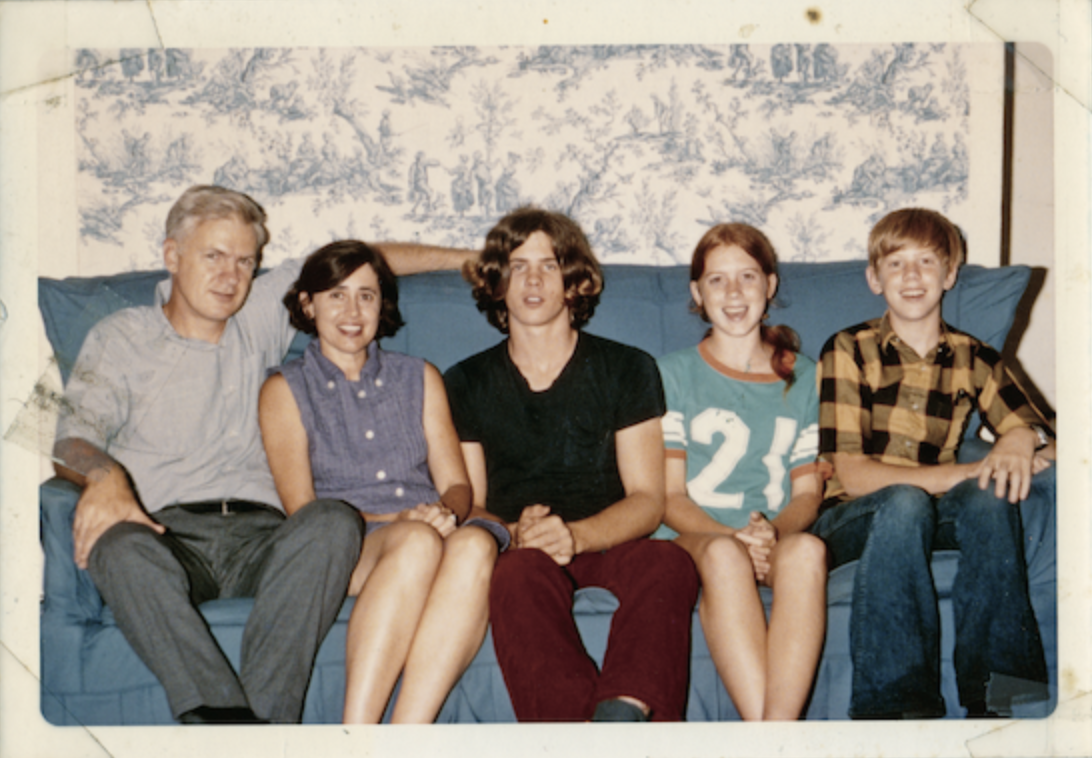
Somebody was interviewing Lydia Lunch about me and she said “yeah, you know, beneath those blonde bangs there is a darkness” and I was just like, we'll leave it at that. I think everybody has a modicum of light and dark in their lives and how it kind of gets reflected in their own intellect, in their own decision making processes, the good and bad dynamics. It’s something that is so completely and utterly shared by everybody that for me to actually sort of talk about that specifically? I don't really care to. In fact, I find it to be more interesting if it's not talked about because for me, the one thing I always loved so much about music and literature is mystery. There used to be a lot more mystery before the internet and, going back to the digital reality of now, it's kind of diffused a lot of the mystery that was so inherent in actually going to search for things outside of the home, but now it's in the home. So I like to retain mystery. I really wanted it [Sonic Life] to be this exposition of what all this shared energy was like, trying to show how palpable and real it is. That's what I wanted to do with the language of the book, more than anything.
Sonic Life (Faber) is Rough Trade Book of the Year 2023. Signed copies available now at Rough Trade.
